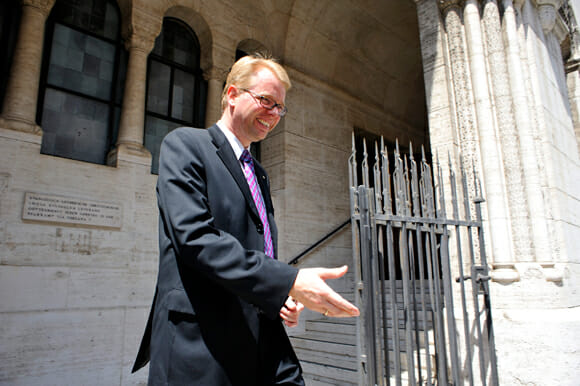
Oct 31, 2015 | Non categorizzato
It was in a spirit of ecumenism that 80 Christians from different denominations gathered on September 12th in the German town of Zwochau.  During her visit to Zwochau in 2013, on behalf of the Movement Maria Voce expressed the desire to know Martin Luther better and also the faithful of the Lutheran Church. More recently, because of an exchange of letters last May between Cardinal Marx, president of the German Catholic Bishops Conference and Bishop Bedford Strohm, Chairman of the Evangelische Kirche in Deutschland (EKD), the idea was put forward of promoting more cooperation between Christian confessions in view of the 500th anniversary of the Reformation that will be celebrated in 2017. There were two points for reflection. The first, given by Lutheran theologian Florian Zobel, focused on Luther and his life, highlighting several little known aspects, and concluded with the words of Pope Benedict XVI: “For Luther theology was not an academic issue, but the interior struggle with himself. […] The question: ‘Where does God stand in relation to me? How do I stand before God?’ […] I think that this is the first summons we should hear from Luther.” The second point presented by Catholic theologian and researcher on Luther, Hubertus Blaumeiser, focused on the spirituality of the reformer monk and, in particular, the “theology of the cross” and the meaning of “Reform” that followed: “Not merely a transformation, a change or improvement in accordance with one’s personal plans,” he said, “but a new beginning, starting from the roots; that is, the return to the Scripture, […] to the Gospel of God’s grace and to the new choice of a life with, for and through the Crucified Christ.” In the afternoon a roundtable was held, moderated by Hermann Schweers and Lutheran pastor, Axel Meissner of Schkeuditz, and Emeritus Bishop Joachim Reinelt of Dresda. There were numerous interventions from the audience that touched upon topics such as the importance of the ecumenical effort in a society of non-believers, and the meaning of the Reform for today’s world. The day concluded with an ecumenical celebration.
During her visit to Zwochau in 2013, on behalf of the Movement Maria Voce expressed the desire to know Martin Luther better and also the faithful of the Lutheran Church. More recently, because of an exchange of letters last May between Cardinal Marx, president of the German Catholic Bishops Conference and Bishop Bedford Strohm, Chairman of the Evangelische Kirche in Deutschland (EKD), the idea was put forward of promoting more cooperation between Christian confessions in view of the 500th anniversary of the Reformation that will be celebrated in 2017. There were two points for reflection. The first, given by Lutheran theologian Florian Zobel, focused on Luther and his life, highlighting several little known aspects, and concluded with the words of Pope Benedict XVI: “For Luther theology was not an academic issue, but the interior struggle with himself. […] The question: ‘Where does God stand in relation to me? How do I stand before God?’ […] I think that this is the first summons we should hear from Luther.” The second point presented by Catholic theologian and researcher on Luther, Hubertus Blaumeiser, focused on the spirituality of the reformer monk and, in particular, the “theology of the cross” and the meaning of “Reform” that followed: “Not merely a transformation, a change or improvement in accordance with one’s personal plans,” he said, “but a new beginning, starting from the roots; that is, the return to the Scripture, […] to the Gospel of God’s grace and to the new choice of a life with, for and through the Crucified Christ.” In the afternoon a roundtable was held, moderated by Hermann Schweers and Lutheran pastor, Axel Meissner of Schkeuditz, and Emeritus Bishop Joachim Reinelt of Dresda. There were numerous interventions from the audience that touched upon topics such as the importance of the ecumenical effort in a society of non-believers, and the meaning of the Reform for today’s world. The day concluded with an ecumenical celebration.

Pastor Jens-Martin Kruse. Photo: Harald Krille
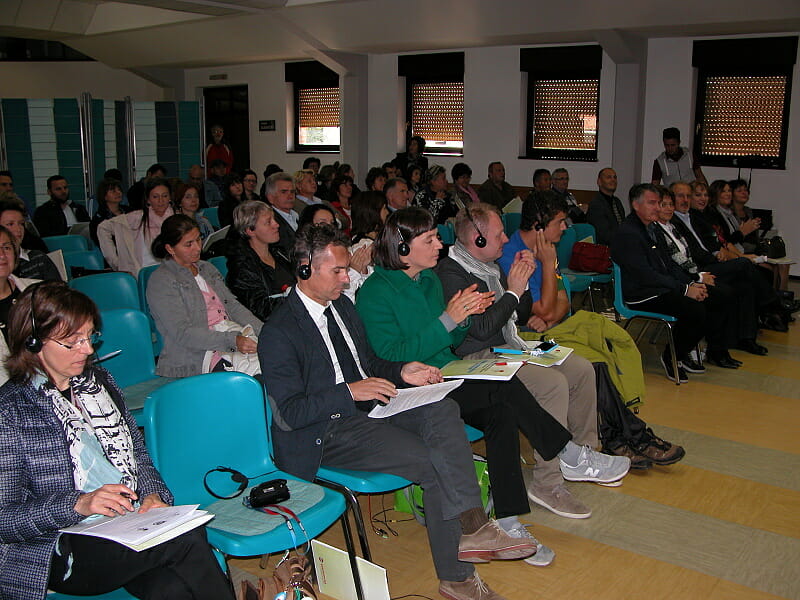
Oct 30, 2015 | Focolare Worldwide, Senza categoria
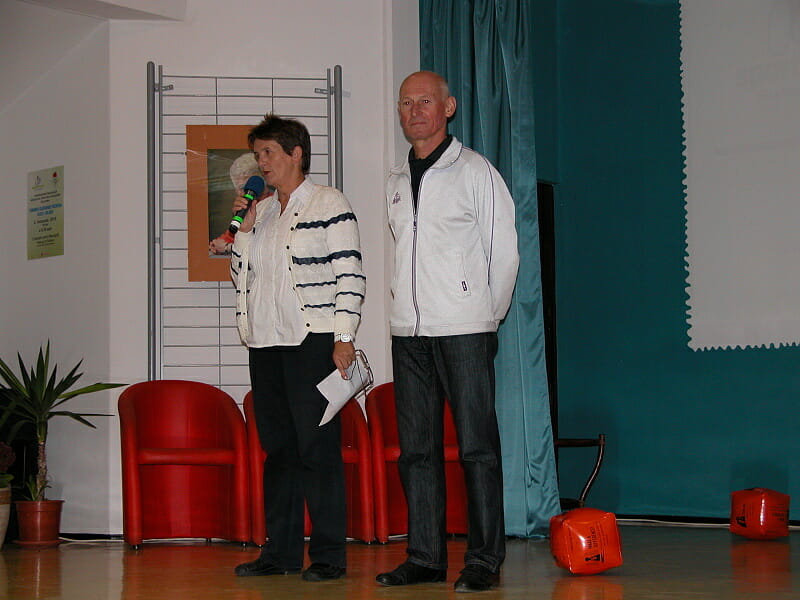 Can sports contribute to building a more united world? Could it become a field of action and a tool for unity among individuals and peoples? These were the queries that sparked up the experience of the founders of Sportmeet, motivated by the sharing of the common passion for sports. “Since we were not sure we had all the answers, we scouted out the people and experiences of the sports world that could help us, and through the years were able to establish, specifically three elements that trace the identity of Sportmeet: the high consideration for sports as an important aspect of society; the capacity and objective to unite the most diverse categories of people interested in sports; and the challenge to merge theory and practice in a framework which tends to separate the sports specialists from those who practice it.” These were some excerpts from the speech of Paolo Cipolli, President of Sportmeet for a United World, which opened the seventh convention organized by the Sportmeet network in Krizevci (Croatia). The intent was to consider sports in dialogue with contemporary society, with the conviction that it can give a specific, stimulating and positive contribution to culture and the construction of active and responsible citizenship.
Can sports contribute to building a more united world? Could it become a field of action and a tool for unity among individuals and peoples? These were the queries that sparked up the experience of the founders of Sportmeet, motivated by the sharing of the common passion for sports. “Since we were not sure we had all the answers, we scouted out the people and experiences of the sports world that could help us, and through the years were able to establish, specifically three elements that trace the identity of Sportmeet: the high consideration for sports as an important aspect of society; the capacity and objective to unite the most diverse categories of people interested in sports; and the challenge to merge theory and practice in a framework which tends to separate the sports specialists from those who practice it.” These were some excerpts from the speech of Paolo Cipolli, President of Sportmeet for a United World, which opened the seventh convention organized by the Sportmeet network in Krizevci (Croatia). The intent was to consider sports in dialogue with contemporary society, with the conviction that it can give a specific, stimulating and positive contribution to culture and the construction of active and responsible citizenship.  About a hundred participants – deans, teachers of movement control sciences schools, pedagogists, athletes, heads of sports clubs, referees, educators, university students, and sports journalists, most of whom did not declare any religious convictions – coming from various regions of Croatia and Serbia, turned up at the event held at the “Mariapolis Faro” in Croatia from 2 to 4 October. Also present were the local and regional institutions that sponsored the Convention, as well as the national TV channel, local radio, and athlete, Branko Zorko, half-marathon road running specialist and three times world Olympic champion in the 1500-metre race, a native of the place and who has been in contact with Sportmeet for some time now. The theme of the convention “Free time as a resource for the young generations,” which evidenced the great changes and risks deriving from the massive use of the internet and diffusion of new technologies, was clearly and passionately underlined by Mirna Andrijašević of the Faculty of Motor Sciences of Zagreb. Alexandar Ivanosky of the private Sports and Health Faculty of Belgrade (Serbia), underlined the importance of the presence of adults, and called all to face the challenge of seeking creative approaches together with the youth who are often alone in facing the powerful stimuli of technology and the social networks. Milan Čapalija, psychiatrist, and Majda Fajdetić, pedagogist of the Zagreb Ministry of Education, highlighted the various methodologies that promote pedagogic action in reassessing the importance of games and sports. Various interactive workshops ended with a game for boys and girls of the high school in the city’s charming main square. It was a testing ground and at the same time also an occasion to divulge the typical activities of Sportmeet which centres on dialogue as a resource and essential opportunity to promote a new sports culture. As a sign of the atmosphere of esteem and trust which has grown over the years, Alexandar Ivanosky (Serbia), underlined the capacity of Croatian sports athletes to excel in team sports and encouraged even greater stringent interaction to share the spirit of fraternity that drives this group in the Balkans and also in other parts of the world. The convention closed with the announcement of the next Summer School 2016 to be held in the same city of Krizevci from 14 to 17 July.
About a hundred participants – deans, teachers of movement control sciences schools, pedagogists, athletes, heads of sports clubs, referees, educators, university students, and sports journalists, most of whom did not declare any religious convictions – coming from various regions of Croatia and Serbia, turned up at the event held at the “Mariapolis Faro” in Croatia from 2 to 4 October. Also present were the local and regional institutions that sponsored the Convention, as well as the national TV channel, local radio, and athlete, Branko Zorko, half-marathon road running specialist and three times world Olympic champion in the 1500-metre race, a native of the place and who has been in contact with Sportmeet for some time now. The theme of the convention “Free time as a resource for the young generations,” which evidenced the great changes and risks deriving from the massive use of the internet and diffusion of new technologies, was clearly and passionately underlined by Mirna Andrijašević of the Faculty of Motor Sciences of Zagreb. Alexandar Ivanosky of the private Sports and Health Faculty of Belgrade (Serbia), underlined the importance of the presence of adults, and called all to face the challenge of seeking creative approaches together with the youth who are often alone in facing the powerful stimuli of technology and the social networks. Milan Čapalija, psychiatrist, and Majda Fajdetić, pedagogist of the Zagreb Ministry of Education, highlighted the various methodologies that promote pedagogic action in reassessing the importance of games and sports. Various interactive workshops ended with a game for boys and girls of the high school in the city’s charming main square. It was a testing ground and at the same time also an occasion to divulge the typical activities of Sportmeet which centres on dialogue as a resource and essential opportunity to promote a new sports culture. As a sign of the atmosphere of esteem and trust which has grown over the years, Alexandar Ivanosky (Serbia), underlined the capacity of Croatian sports athletes to excel in team sports and encouraged even greater stringent interaction to share the spirit of fraternity that drives this group in the Balkans and also in other parts of the world. The convention closed with the announcement of the next Summer School 2016 to be held in the same city of Krizevci from 14 to 17 July.
Oct 29, 2015 | Non categorizzato
On the 50th anniversary of Gravissimum educationis, the Second Vatican Council document on Education, a World Congress promoted by the Congregation for Catholic Education will held in Rome, Italy. The title of the conference: Educating Today and Tomorrow. . . .A Renewing Passion The congress will be attended by people engaged in the educational mission in Catholic schools and universities around the world. They will give a global glance to see what the contribution of the Christian community can be in multi-cultural and multi-religious contexts that are rapidly changing. The present educational and social emergency demands a review of educational approaches that are capable of transforming reality and are within the reach and the needs of children, teenagers and young people. The congress will include reports, testimonies and roundtables with experts from around the world. The congress will have three sessions:
- Opening Session(November 18, in Paolo VI Hall, Vatican City, Italy)
- The Main Session divided into Subsections: “School and University” (November 19-20, at the Mariapolis Centre of Castel Gandolfo, Italy); and OIEC Congress (at l’Auditorium di Via della Conciliazione, Rome, Italy)
- Closing Session (November 21, at Paul VI Hall, Vatican City, Italy) with an address by Pope Francis.
During the Closing Session in the presence of the Pope, the Service Learning Educational Model will be presented, which borrows several of its philosophical and methodological foundations from Chiara Lubich’s Education for Communion proposal as a proven educational approach that the Congregation for Catholic Education will recommend to educational institutions of the whole world.
Oct 29, 2015 | Non categorizzato
“Within a month, I will receive in Constantinople the Bishop Friends of the Movement:” The Ecumenical Patriarch of Constantinople himself announced to the press the news of the upcoming Meeting of Bishops from Different Churches, Friends of the Focolare that will be held in Istanbul on November 25-30, 2015. He made the announcement during an interview following the Ceremony of the Honorary Degree in the Culture of Unity, October 26, 2015 at Sophia University Institute, Loppiano, Italy. “We will have a meeting in Halki,” he continued, “at the school of theology, and there we will have the opportunity to remember Chiara Lubich and pray for the repose of her soul, and express our experiences and our will to work for the unity of the Churches. We, as the Church of Constantinople, are happy and ready to welcome them, to exchange our experiences and the Kiss of Peace between East and West.”
![Protagonists in building a world of peace]()
Oct 29, 2015 | Non categorizzato
 This is the title, but also the wish of the European Assembly of Religions for Peace (RfP), the organism that gathers the unites religious leaders of the world in walking together in the search for peace and justice, and Maria Voce is the co-president. Religions for Peace is currently involved in a global campaign called the Faiths for Earth project. “A very important initiative,” said Voce, because “humankind is facing an unprecedented challenge of global proportions, with little time left before it is too late. I see a providential synergy with the Pope’s Encyclical Laudato si’, which has generated such great interest around the world. In her opening address, on October 29, the Focolare’s president recalled the recent events that have changed the face of Europe. In front of the “tide of immigrants and migrants without historical precedent,” […] “Numerically speaking this phenomenon is far greater than the one million stateless people after the Second World War,” Maria Voce highlighted the dramatic situation that make us feel “dismayed, at a loss, and sometimes very uncomfortable, perhaps also deeply ashamed at our own powerlessness.” Among the causes she pointed to, also the “dramatic and questionable military interventions which destabilised whole nations in North Africa, the Middle East and Sub-Saharan Africa and other ongoing conflicts. Our European nations are certainly not completely blameless with regard to these conflicts. ” Great concern: “What is most worrisome about our continent is the deep identity crisis which prevents these emergencies from being addressed in a co-ordinated and united way; and the “people fleeing from hunger and war becoming often the cause of strife and nationalistic backlashes. They continue to be victims of selfish exploitation, and become tools in political strategies to win favour and promote dangerous populist action.” And so, “believers, as members of varied religious traditions, together with all men and women of good will” join the cause. “We are certainly different,” Maria Voce acknowledges, “but we are all united by the same imperative, so well expressed by the Golden Rule put in many different ways in all our scriptures. We can sum it up in these words: “Do to others as you would have them do to you.” (Luke 6:31). The Golden Rule is an ethical and spiritual norm that is too often forgotten. It has been put forward by Pope Francis as a true socio-political paradigm in his speech before Congress in the United States a few weeks ago.” The Golden Rule “calls us to respond to these crises, inviting us as leaders, as communities and as individuals to a shared commitment, one that is concrete, constant and heroic, even, so as to come to the aid of the mass of suffering people who plead for help, who are weeping and struggling and who, despite everything, carry on hoping. And it opens a window: “In fact, religion itself, which for centuries has been relegated to the private life of individuals and communities, and was considered by many as finished with until a few decades ago, has now become more accepted within the public life of our countries and our continent. It is needed today to give meaning and a soul, as well as true and satisfying answers, to humankind which is so confused and lost and traumatised today. It is enough to think of Pope Francis and the effect he is having in the world.” “This is the extraordinary adventure that we are called to live in our day and Religions for Peace is a providential platform: each one of us has a clear role in its immense workings. We are a wonderful international, intercultural and interreligious community, made one family above all by the shared ideal,” based on several basic points: Unity in diversity; Reciprocity in our relationships; and equality in our shared human dignity.” “On this solid foundation” it will be possible to “offer an effective contribution to peace and reconciliation in Europe;” and to set a final goal for ourselves: “humankind living according to God’s design fulfilled, which means universal fraternity.”
This is the title, but also the wish of the European Assembly of Religions for Peace (RfP), the organism that gathers the unites religious leaders of the world in walking together in the search for peace and justice, and Maria Voce is the co-president. Religions for Peace is currently involved in a global campaign called the Faiths for Earth project. “A very important initiative,” said Voce, because “humankind is facing an unprecedented challenge of global proportions, with little time left before it is too late. I see a providential synergy with the Pope’s Encyclical Laudato si’, which has generated such great interest around the world. In her opening address, on October 29, the Focolare’s president recalled the recent events that have changed the face of Europe. In front of the “tide of immigrants and migrants without historical precedent,” […] “Numerically speaking this phenomenon is far greater than the one million stateless people after the Second World War,” Maria Voce highlighted the dramatic situation that make us feel “dismayed, at a loss, and sometimes very uncomfortable, perhaps also deeply ashamed at our own powerlessness.” Among the causes she pointed to, also the “dramatic and questionable military interventions which destabilised whole nations in North Africa, the Middle East and Sub-Saharan Africa and other ongoing conflicts. Our European nations are certainly not completely blameless with regard to these conflicts. ” Great concern: “What is most worrisome about our continent is the deep identity crisis which prevents these emergencies from being addressed in a co-ordinated and united way; and the “people fleeing from hunger and war becoming often the cause of strife and nationalistic backlashes. They continue to be victims of selfish exploitation, and become tools in political strategies to win favour and promote dangerous populist action.” And so, “believers, as members of varied religious traditions, together with all men and women of good will” join the cause. “We are certainly different,” Maria Voce acknowledges, “but we are all united by the same imperative, so well expressed by the Golden Rule put in many different ways in all our scriptures. We can sum it up in these words: “Do to others as you would have them do to you.” (Luke 6:31). The Golden Rule is an ethical and spiritual norm that is too often forgotten. It has been put forward by Pope Francis as a true socio-political paradigm in his speech before Congress in the United States a few weeks ago.” The Golden Rule “calls us to respond to these crises, inviting us as leaders, as communities and as individuals to a shared commitment, one that is concrete, constant and heroic, even, so as to come to the aid of the mass of suffering people who plead for help, who are weeping and struggling and who, despite everything, carry on hoping. And it opens a window: “In fact, religion itself, which for centuries has been relegated to the private life of individuals and communities, and was considered by many as finished with until a few decades ago, has now become more accepted within the public life of our countries and our continent. It is needed today to give meaning and a soul, as well as true and satisfying answers, to humankind which is so confused and lost and traumatised today. It is enough to think of Pope Francis and the effect he is having in the world.” “This is the extraordinary adventure that we are called to live in our day and Religions for Peace is a providential platform: each one of us has a clear role in its immense workings. We are a wonderful international, intercultural and interreligious community, made one family above all by the shared ideal,” based on several basic points: Unity in diversity; Reciprocity in our relationships; and equality in our shared human dignity.” “On this solid foundation” it will be possible to “offer an effective contribution to peace and reconciliation in Europe;” and to set a final goal for ourselves: “humankind living according to God’s design fulfilled, which means universal fraternity.”
Oct 29, 2015 | Non categorizzato, Word of
[soundcloud url=”https://api.soundcloud.com/tracks/232719178″ params=”color=ff5500&auto_play=false&hide_related&visual=false&show_comments=true&show_user=true&show_reposts=false” width=”100%” height=”166″ iframe=”true” /]
‘That they may all be one’ (Jn 17:21). We can share God’s own dream and, as Jesus did, live and pray for unity. It will lead us down his path of death and resurrection together with him. This is the last, heartfelt prayer that Jesus spoke to the Father. He knew he was asking the thing closest to his heart. God, indeed, created humanity as his family, to give it every good thing, sharing his very own divine life. What do parents dream for their children if not that they should care for one another, help one another, live united with one another? And what saddens them more than seeing their children divided by jealousy or money matters, even to the point of not speaking to each other? God too has dreamt from all eternity of a family of his own living united as children in a communion of love with him and with one another. The Bible’s dramatic origin story speaks to us of sin and of the progressive break-up of the human family. As we read in the book of Genesis, the man accused the woman, Cain killed his own brother, Lamech took pride in his exaggerated vendetta, Babel generated misunderstanding and the separation of peoples… God’s project looked like a failure. Nonetheless, he did not give in and with determination sought the reunification of his family. The story begins again with Noah, with the choice of Abraham, with the birth of the chosen people. And so it goes on, to the point of deciding to send his Son to earth entrusted with a great mission: to gather into one family the separated children, to welcome the lost sinners into a single fold, to break down the walls of separation and the hostilities among peoples to create one new people (see Eph 2:14-16). God does not cease to dream of unity, and for this reason Jesus asks it of him as the greatest gift he can implore for all of us – ‘Father, I pray That they may all be one.’ Every family looks like its parents. So too the family of God. God is Love not only because he loves what he creates; but he is Love in himself, in mutual giving and communion, lived out by each of the three divine Persons with the others. Therefore when God created the human race he made it in his image and likeness and he impressed upon it the same capacity for relationship, so that every person may live in mutual self-giving. A more complete version of the words in the prayer of Jesus that we want to live this month, in fact, says: ‘that they may all be one. As you, Father, are in me and I am in you, may they also be in us.’ The model for our unity is nothing less than the unity that exists between the Father and Jesus. It seems impossible, so profound is it. It is, however, made possible by that ‘As’, which means also ‘Because’. We can be united as the Father and Jesus are united because they draw us into their own unity, they give it to us as a gift. ‘That they may all be one.’ Precisely this is the work of Jesus, making all of us one, as he is with the Father, one single family, one people. To do this he made himself one of us, took upon himself all our divisions and our sins, nailing them to the cross. He himself pointed out the way he would take to bring us to unity: ‘And I, when I am lifted up from the earth, will draw all people to myself’ (Jn 12:32). As the High Priest had prophesied, he had to die ‘to gather into one the dispersed children of God’ (Jn 11:52). In his mystery of death and resurrection, he has gathered up all things into himself (see Eph 1:10), has recreated the unity broken by sin, has remade the family around the Father and has made us again brothers and sisters of one another. Jesus has completed his mission. What is left now is our part, our participation, our ‘yes’ to his prayer: ‘That they may all be one.’ What is our contribution to fulfilling this prayer? In the first place we have to make it our own. We can offer our lips and heart to Jesus so that he can continue speaking these words to the Father and with trust we can repeat his prayer every day. Unity is a gift from above, to be asked with faith, without ever growing tired. More than this it must be constantly at the forefront of our thoughts and wishes. If this is God’s dream, we want it to be ours as well. Periodically and before every decision, every choice, every action, we can ask ourselves: does this help to build unity, is it the best thing to do to bring about unity? And finally we ought to run to wherever disunity is most evident and take it upon ourselves as Jesus did. There may be friction in our family or among people we know, tensions in our neighbourhood, disagreements at work, in the parish, among the Churches. Never shy away from dissension and incomprehension, never be indifferent, but take to them our love that becomes listening, attention to the other person, sharing in the pain that results from that open wound. And above all live in unity with whoever is open to sharing Jesus’s ideal and prayer, without giving weight to misunderstandings or contrasting ideas, but content with ‘what is less perfect in unity more than what is more perfect in disunity’, accepting the differences with joy, indeed considering them richnesses for a unity that is never a reduction to uniformity. Yes, at times this will put us on the cross, but is it precisely the way Jesus chose to remake the unity of the human family, the way we too wish to walk with him. Fabio Ciardi
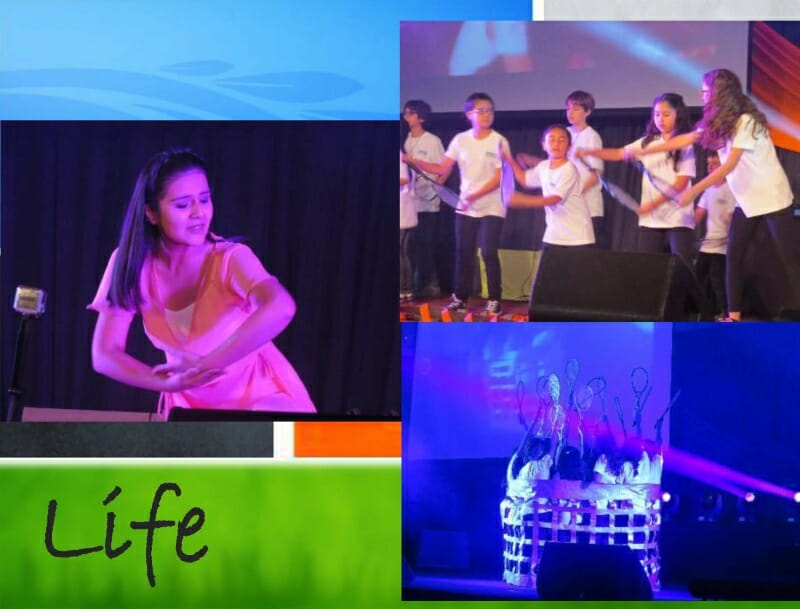
Oct 29, 2015 | Focolare Worldwide
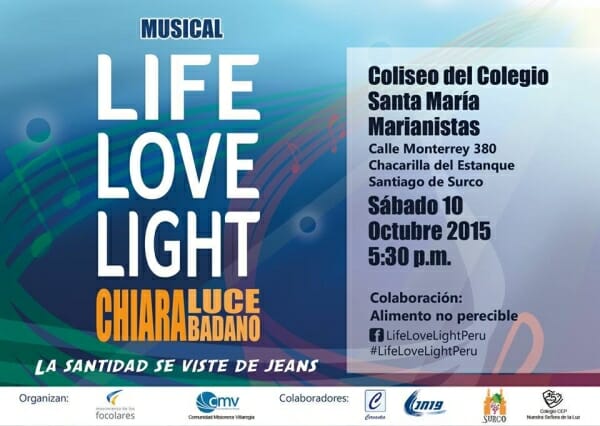 The musical, “Life, Love Light,” inspired by the life of Blessed Chiara Luce Badano, has arrived in Peru: on October 10th, just a few days after the 5th anniversary of the beatification of the young woman from Sassello, the show took the stage in Lima. Months ago, the Peruvian young people of the Focolare Movement had already contacted their Spanish peers, who had put on the same show in Burgos in their language, in order to obtain the materials. They were helped by the collaboration of the Community of Villaregia and the Misioneras Identes and several professionals – as they admit, “The show was beyond our capacities,” – who undertook the preparation of the musical.
The musical, “Life, Love Light,” inspired by the life of Blessed Chiara Luce Badano, has arrived in Peru: on October 10th, just a few days after the 5th anniversary of the beatification of the young woman from Sassello, the show took the stage in Lima. Months ago, the Peruvian young people of the Focolare Movement had already contacted their Spanish peers, who had put on the same show in Burgos in their language, in order to obtain the materials. They were helped by the collaboration of the Community of Villaregia and the Misioneras Identes and several professionals – as they admit, “The show was beyond our capacities,” – who undertook the preparation of the musical. 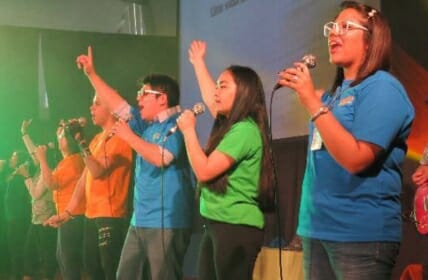 There were 75 young people who participated in the musical production, both from the Focolare and from other Movements who got involved. And one cannot overlook a series of “fortunate coincidences” in which the young people saw the hand of God’s Providence: from the availability of a hall which seats hundreds in a well-known section of Lima, to the meals brought for the whole team, thanks to the generosity of an adherent of the Movement, to the interviews released to two television stations – one of which taped the show for a pre-recorded broadcast.
There were 75 young people who participated in the musical production, both from the Focolare and from other Movements who got involved. And one cannot overlook a series of “fortunate coincidences” in which the young people saw the hand of God’s Providence: from the availability of a hall which seats hundreds in a well-known section of Lima, to the meals brought for the whole team, thanks to the generosity of an adherent of the Movement, to the interviews released to two television stations – one of which taped the show for a pre-recorded broadcast. 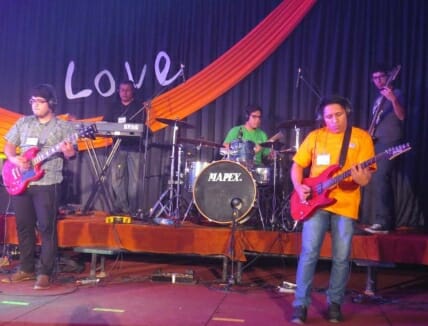 Even the 500 spectators did not hold back their generosity: while the admission was free, they responded to the appeal to donate dry or canned goods, which arrived in great quantities, to give to the needy people in the Community of Villaregia. The show was a great success in other ways, as the participants testified that it helped them to discover and value many hidden talents. A touching testimony was given by a mother of a 13-year-old girl affected by a serious form of depression, who said: “You have changed my daughter’s life.”
Even the 500 spectators did not hold back their generosity: while the admission was free, they responded to the appeal to donate dry or canned goods, which arrived in great quantities, to give to the needy people in the Community of Villaregia. The show was a great success in other ways, as the participants testified that it helped them to discover and value many hidden talents. A touching testimony was given by a mother of a 13-year-old girl affected by a serious form of depression, who said: “You have changed my daughter’s life.”  A message sent by Chiara Luce’s parents, Ruggero e Maria Teresa Badano, closed the evening, with their thanks for all that was achieved: “Her push towards sanctity and her faithfulness to the values of the Gospel of Jesus,” they wrote, “guided Chiara Luce even in the most difficult moments of her existence, and we are convinced that she will know how to inspire you. Because, as her spiritual mother Chiara Lubich said, ‘You have only one life, it’s worthwhile to live it well.’“
A message sent by Chiara Luce’s parents, Ruggero e Maria Teresa Badano, closed the evening, with their thanks for all that was achieved: “Her push towards sanctity and her faithfulness to the values of the Gospel of Jesus,” they wrote, “guided Chiara Luce even in the most difficult moments of her existence, and we are convinced that she will know how to inspire you. Because, as her spiritual mother Chiara Lubich said, ‘You have only one life, it’s worthwhile to live it well.’“
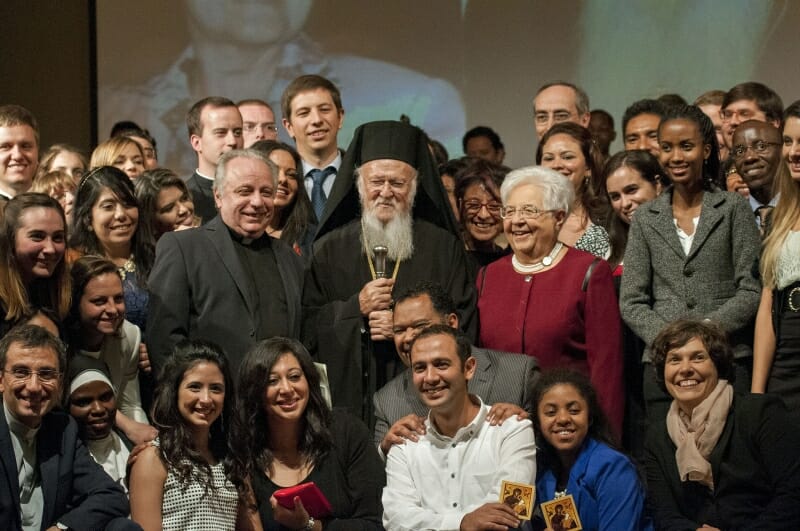
Oct 28, 2015 | Focolare Worldwide
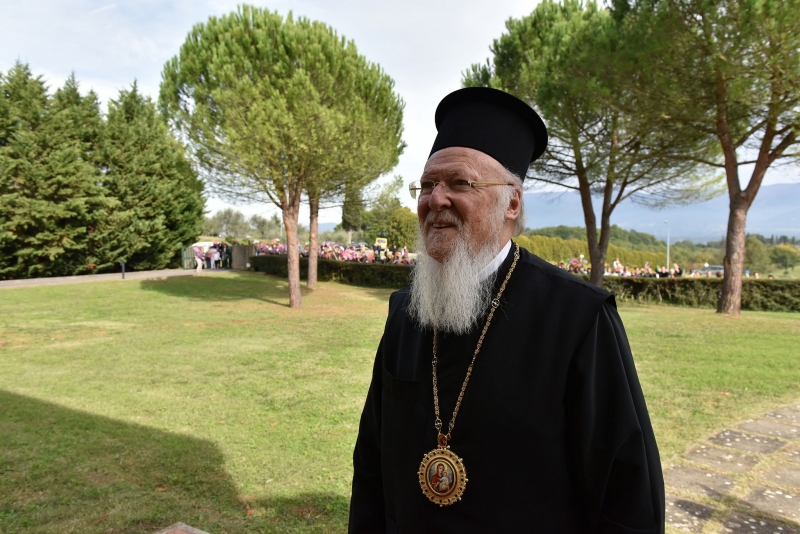
© CSC Audiovisivi

© CSC Audiovisivi
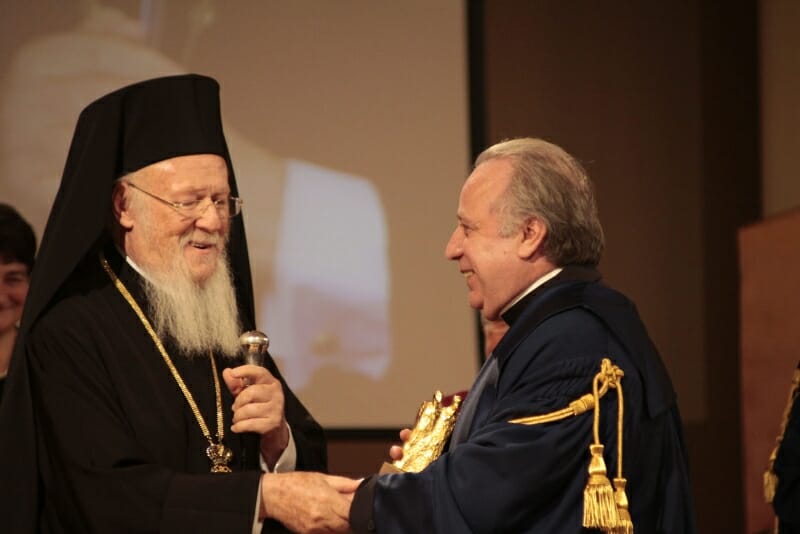
Oct 28, 2015 | Non categorizzato

Foto © CSC Audiovisivi
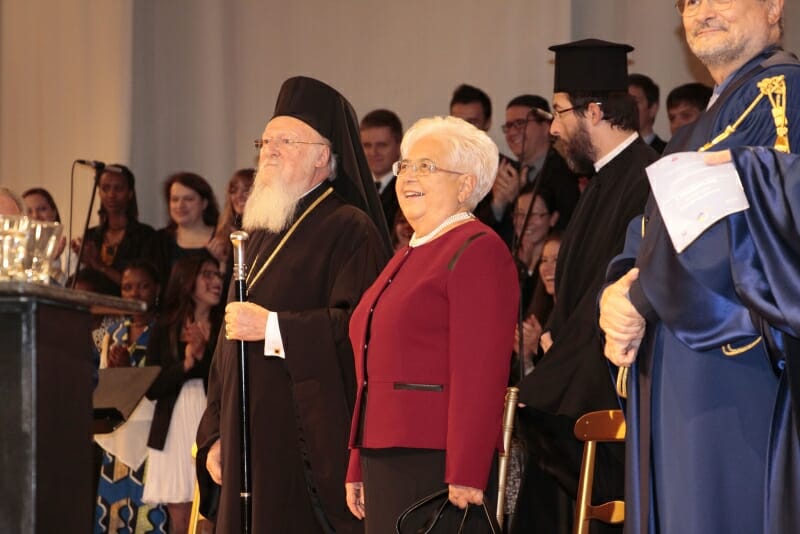
Oct 27, 2015 | Non categorizzato
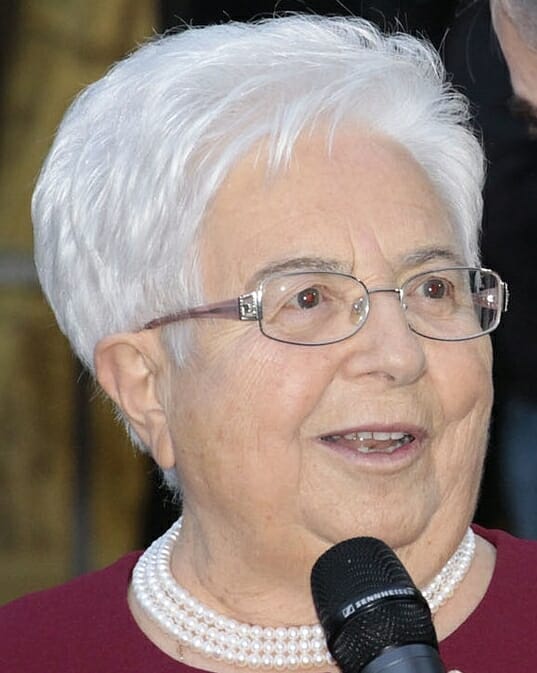 “Everyone was so touched by the brotherly affection that joins the Holy Father Francesco to His Holiness Patriarch Bartholomew. The Pope recognizes the Patriarch’s commitment in the journey of unity, which he describes as our common journey. Not only that: he very courageously says that this Honorary Degree is a step ahead in that journey.” You know the Patriarch very well, you have lived and now live even more intensely, this moment in a long history of closeness between the Focolare Movement and the Orthodox Church and its Patriarchs. What are your views on this Patriarch and the significance of this recognition? “Patriarch Bartholomew is the heir of the great Patriarch Athenagoras who really possessed this passion for unity which, in him, was almost a prophetic vision that he was not able to realize. This passion was transmitted particularly to Patriarch Bartholomew who never misses an opportunity to press for unity in the heart of the Orthodox Church, so that they can talk to one another to the Church of Rome with a voice that is already in a certain sense synodal. He tries in many ways to emphasise how much this journey together is alive. I think we are truly at a happy moment because there is gentle pressure being given by two heads of our two Churches, and that cannot but produce fruit. There will be resistance as Pope Francis pointed out at the conclusion of the Synod, but in the end there is the Holy Spirit who will help us, who pushes the Church securely towards the unity of the Churches. We think that this is a happy moment and that this recognition might be an important step, a concrete step on this journey.”
“Everyone was so touched by the brotherly affection that joins the Holy Father Francesco to His Holiness Patriarch Bartholomew. The Pope recognizes the Patriarch’s commitment in the journey of unity, which he describes as our common journey. Not only that: he very courageously says that this Honorary Degree is a step ahead in that journey.” You know the Patriarch very well, you have lived and now live even more intensely, this moment in a long history of closeness between the Focolare Movement and the Orthodox Church and its Patriarchs. What are your views on this Patriarch and the significance of this recognition? “Patriarch Bartholomew is the heir of the great Patriarch Athenagoras who really possessed this passion for unity which, in him, was almost a prophetic vision that he was not able to realize. This passion was transmitted particularly to Patriarch Bartholomew who never misses an opportunity to press for unity in the heart of the Orthodox Church, so that they can talk to one another to the Church of Rome with a voice that is already in a certain sense synodal. He tries in many ways to emphasise how much this journey together is alive. I think we are truly at a happy moment because there is gentle pressure being given by two heads of our two Churches, and that cannot but produce fruit. There will be resistance as Pope Francis pointed out at the conclusion of the Synod, but in the end there is the Holy Spirit who will help us, who pushes the Church securely towards the unity of the Churches. We think that this is a happy moment and that this recognition might be an important step, a concrete step on this journey.”  In his speech the Patriarch spoke precisely about what unity is and that it is different from union, which is different from uniqueness – diversity as richness, a concept that is quite present in the charism lived by Chiara Lubich. Could you explain to us a little more, in what way? “Chiara was always reminding us that the Church’s journey is guided by the Holy Spirit, and therefore He was surely maturing gifts in all the Churches of Christianity that would serve unity, that would serve if they were put in common. These gifts do not flatten but respect the diversity, precisely because they recognize a great richness in these diversities that only makes the Church more beautiful as Jesus wanted it. No uniformity therefore, but unity in diversity. Chiara would tell us that the highest model is the unity that joins the Most Holy Trinity where the Father is Himself because He is not the Son; the Son is Himself because He is not the Father; but the love that there is between the Father and the Son generates none other than the Holy Spirit who is the Third in this Trinitarian dimension, but is also the First since He links the Father and the Son. And this can happen because each of the Three Divine Persons of the Most Holy Trinity completely loses Himself in the other. This is precisely what is required for the Church’s journey; that is, that each one be able to completely lose himself in the other church; which means being able to reach all the way down to the bottom of one’s own richness and give it all to the other, to the others. Therefore, it requires knowing how to be love in order to build that Church of Christ in which each Christian, no matter what Christian community they belong to, feels like a sharer in the Body of Christ.” With this award, are there any new prospects that might open? “We were actually talking with the Patriarch himself about the possibility of eventually instituting a Chair at Sophia University Institute that would be part Roman Catholic and part Orthodox and would study such figures as Chiara Lubich and Patriarch Athenagoras, trying to sort out and understand the contribution they made and can continue make, through the encounter of their two charisms, to this journey of unity.” (From Vatican Radio)
In his speech the Patriarch spoke precisely about what unity is and that it is different from union, which is different from uniqueness – diversity as richness, a concept that is quite present in the charism lived by Chiara Lubich. Could you explain to us a little more, in what way? “Chiara was always reminding us that the Church’s journey is guided by the Holy Spirit, and therefore He was surely maturing gifts in all the Churches of Christianity that would serve unity, that would serve if they were put in common. These gifts do not flatten but respect the diversity, precisely because they recognize a great richness in these diversities that only makes the Church more beautiful as Jesus wanted it. No uniformity therefore, but unity in diversity. Chiara would tell us that the highest model is the unity that joins the Most Holy Trinity where the Father is Himself because He is not the Son; the Son is Himself because He is not the Father; but the love that there is between the Father and the Son generates none other than the Holy Spirit who is the Third in this Trinitarian dimension, but is also the First since He links the Father and the Son. And this can happen because each of the Three Divine Persons of the Most Holy Trinity completely loses Himself in the other. This is precisely what is required for the Church’s journey; that is, that each one be able to completely lose himself in the other church; which means being able to reach all the way down to the bottom of one’s own richness and give it all to the other, to the others. Therefore, it requires knowing how to be love in order to build that Church of Christ in which each Christian, no matter what Christian community they belong to, feels like a sharer in the Body of Christ.” With this award, are there any new prospects that might open? “We were actually talking with the Patriarch himself about the possibility of eventually instituting a Chair at Sophia University Institute that would be part Roman Catholic and part Orthodox and would study such figures as Chiara Lubich and Patriarch Athenagoras, trying to sort out and understand the contribution they made and can continue make, through the encounter of their two charisms, to this journey of unity.” (From Vatican Radio)

 During her visit to Zwochau in 2013, on behalf of the Movement Maria Voce expressed the desire to know Martin Luther better and also the faithful of the Lutheran Church. More recently, because of an exchange of letters last May between Cardinal Marx, president of the German Catholic Bishops Conference and Bishop Bedford Strohm, Chairman of the Evangelische Kirche in Deutschland (EKD), the idea was put forward of promoting more cooperation between Christian confessions in view of the 500th anniversary of the Reformation that will be celebrated in 2017. There were two points for reflection. The first, given by Lutheran theologian Florian Zobel, focused on Luther and his life, highlighting several little known aspects, and concluded with the words of Pope Benedict XVI: “For Luther theology was not an academic issue, but the interior struggle with himself. […] The question: ‘Where does God stand in relation to me? How do I stand before God?’ […] I think that this is the first summons we should hear from Luther.” The second point presented by Catholic theologian and researcher on Luther, Hubertus Blaumeiser, focused on the spirituality of the reformer monk and, in particular, the “theology of the cross” and the meaning of “Reform” that followed: “Not merely a transformation, a change or improvement in accordance with one’s personal plans,” he said, “but a new beginning, starting from the roots; that is, the return to the Scripture, […] to the Gospel of God’s grace and to the new choice of a life with, for and through the Crucified Christ.” In the afternoon a roundtable was held, moderated by Hermann Schweers and Lutheran pastor, Axel Meissner of Schkeuditz, and Emeritus Bishop Joachim Reinelt of Dresda. There were numerous interventions from the audience that touched upon topics such as the importance of the ecumenical effort in a society of non-believers, and the meaning of the Reform for today’s world. The day concluded with an ecumenical celebration.
During her visit to Zwochau in 2013, on behalf of the Movement Maria Voce expressed the desire to know Martin Luther better and also the faithful of the Lutheran Church. More recently, because of an exchange of letters last May between Cardinal Marx, president of the German Catholic Bishops Conference and Bishop Bedford Strohm, Chairman of the Evangelische Kirche in Deutschland (EKD), the idea was put forward of promoting more cooperation between Christian confessions in view of the 500th anniversary of the Reformation that will be celebrated in 2017. There were two points for reflection. The first, given by Lutheran theologian Florian Zobel, focused on Luther and his life, highlighting several little known aspects, and concluded with the words of Pope Benedict XVI: “For Luther theology was not an academic issue, but the interior struggle with himself. […] The question: ‘Where does God stand in relation to me? How do I stand before God?’ […] I think that this is the first summons we should hear from Luther.” The second point presented by Catholic theologian and researcher on Luther, Hubertus Blaumeiser, focused on the spirituality of the reformer monk and, in particular, the “theology of the cross” and the meaning of “Reform” that followed: “Not merely a transformation, a change or improvement in accordance with one’s personal plans,” he said, “but a new beginning, starting from the roots; that is, the return to the Scripture, […] to the Gospel of God’s grace and to the new choice of a life with, for and through the Crucified Christ.” In the afternoon a roundtable was held, moderated by Hermann Schweers and Lutheran pastor, Axel Meissner of Schkeuditz, and Emeritus Bishop Joachim Reinelt of Dresda. There were numerous interventions from the audience that touched upon topics such as the importance of the ecumenical effort in a society of non-believers, and the meaning of the Reform for today’s world. The day concluded with an ecumenical celebration. 



 This is the title, but also the wish of the European Assembly of
This is the title, but also the wish of the European Assembly of 







 “Everyone was so touched by the brotherly affection that joins the Holy Father Francesco to His Holiness Patriarch Bartholomew. The Pope recognizes the Patriarch’s commitment in the journey of unity, which he describes as our common journey. Not only that: he very courageously says that this Honorary Degree is a step ahead in that journey.” You know the Patriarch very well, you have lived and now live even more intensely, this moment in a long history of closeness between the Focolare Movement and the Orthodox Church and its Patriarchs. What are your views on this Patriarch and the significance of this recognition? “Patriarch Bartholomew is the heir of the great Patriarch Athenagoras who really possessed this passion for unity which, in him, was almost a prophetic vision that he was not able to realize. This passion was transmitted particularly to Patriarch Bartholomew who never misses an opportunity to press for unity in the heart of the Orthodox Church, so that they can talk to one another to the Church of Rome with a voice that is already in a certain sense synodal. He tries in many ways to emphasise how much this journey together is alive. I think we are truly at a happy moment because there is gentle pressure being given by two heads of our two Churches, and that cannot but produce fruit. There will be resistance as Pope Francis pointed out at the conclusion of the Synod, but in the end there is the Holy Spirit who will help us, who pushes the Church securely towards the unity of the Churches. We think that this is a happy moment and that this recognition might be an important step, a concrete step on this journey.”
“Everyone was so touched by the brotherly affection that joins the Holy Father Francesco to His Holiness Patriarch Bartholomew. The Pope recognizes the Patriarch’s commitment in the journey of unity, which he describes as our common journey. Not only that: he very courageously says that this Honorary Degree is a step ahead in that journey.” You know the Patriarch very well, you have lived and now live even more intensely, this moment in a long history of closeness between the Focolare Movement and the Orthodox Church and its Patriarchs. What are your views on this Patriarch and the significance of this recognition? “Patriarch Bartholomew is the heir of the great Patriarch Athenagoras who really possessed this passion for unity which, in him, was almost a prophetic vision that he was not able to realize. This passion was transmitted particularly to Patriarch Bartholomew who never misses an opportunity to press for unity in the heart of the Orthodox Church, so that they can talk to one another to the Church of Rome with a voice that is already in a certain sense synodal. He tries in many ways to emphasise how much this journey together is alive. I think we are truly at a happy moment because there is gentle pressure being given by two heads of our two Churches, and that cannot but produce fruit. There will be resistance as Pope Francis pointed out at the conclusion of the Synod, but in the end there is the Holy Spirit who will help us, who pushes the Church securely towards the unity of the Churches. We think that this is a happy moment and that this recognition might be an important step, a concrete step on this journey.”